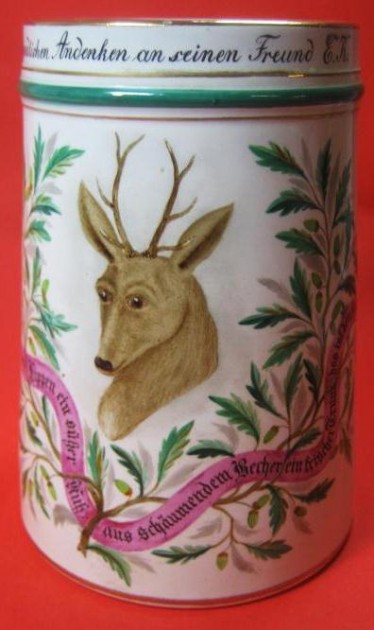
.5 liter hand painted German porcelain beer mug. Ca. 1910. “In memory of our friendship” and more painted on the scroll. From “E. R.”
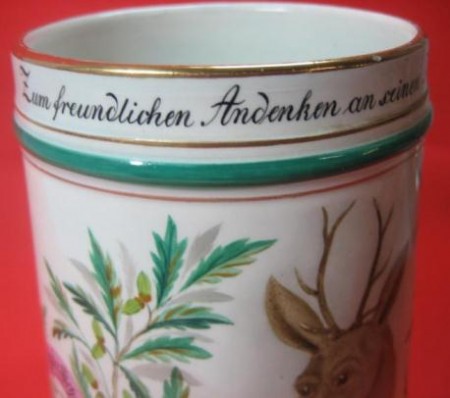
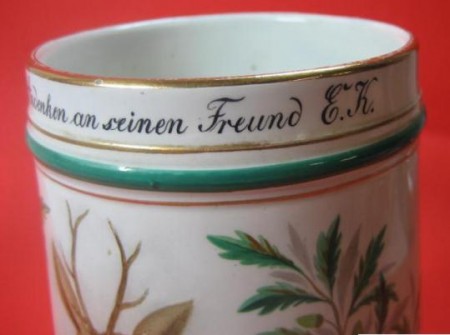
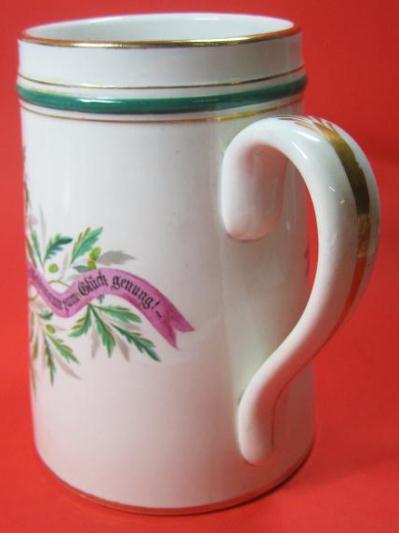
If the scene shows a solitary deer (a few show two with usually one laying down) and no hunter or hunting scene, the stein was probably given as a gift of affection. The symbol of deer, being a beautiful animal and most highly respected in Germany, also means friendship / admiration / love.
Now I am not saying every stein with a deer originally met this criteria, as there were certainly some that were given to hunter’s and woodsmen.
Another point I found interesting on these deer steins is that they show both sexes of deer. This indicated to me that the sex of the recipient was also taken into account.
![FAYENCE - BAYREUTH [SP] -DOES THE DOE ON THE STEIN INDICATE IT WAS FROM A WOMAN OR TO A WOMAN - OR EITHER IS THE QUESTION RFA 4-13](http://www.steveonsteins.com/wp-content/uploads/2011/12/FAYENCE-BAYREUTH-SP-DOES-THE-DOE-ON-THE-STEIN-INDICATE-IT-WAS-FROM-A-WOMAN-OR-TO-A-WOMAN-OR-EITHER-IS-THE-QUESTION-RFA-4-131-326x630.jpg)
This fayence stein is one that plainly shows a doe, and therefore could quite well have been given to a German lady. One liter. Bayreuth. Ca. late 1700’s .[RFA]
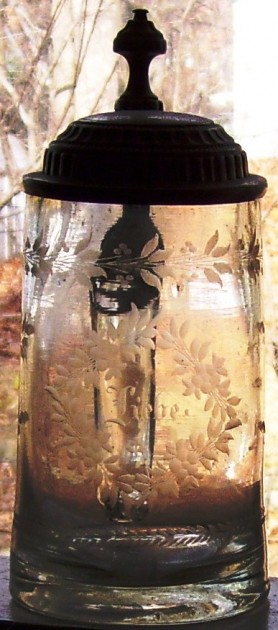
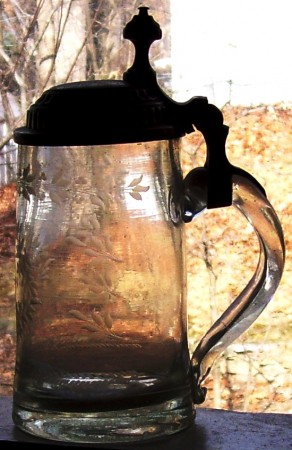
These photos are best seen under a higher magnification. I can never seem to get the artificial lighting correct for glass stein photos at my home. Shown: A .5 liter clear blown glass, very simple “Liebe” engraved in a wreath. Semi -round handle, with urn type thumblift, so it is circa 1820-40. [FWTD]
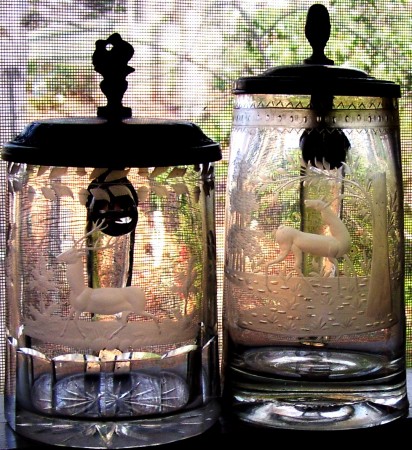
An engraved (or enameled) deer on a glass stein is also usually taken as a “friendship” symbol.
Shown above: [L] Male deer (buck) Circa 1840-50, which comes with the “kissing dove thumblift” which was very popular at the time, which also indicates more “love” than it does friendship or admiration. [R] A nice .5 liter, fancifully engraved with a ‘female’ deer. Circa 1820 – 30. [BOTH FWTD]
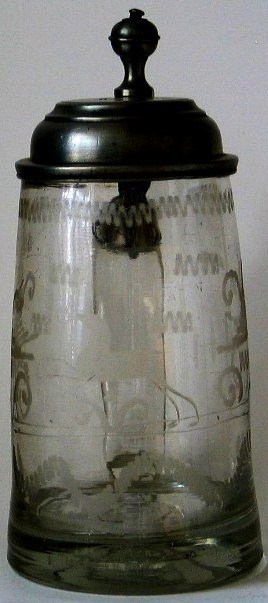
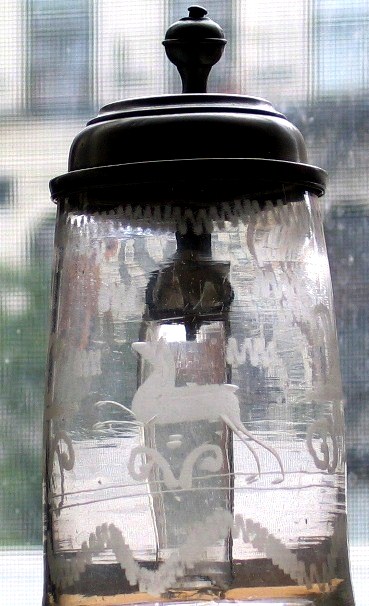
Shown above ▲: One liter blown with an engraved ‘female’ deer. Detail on right above. Circa 1810 -1830. [FWTD]
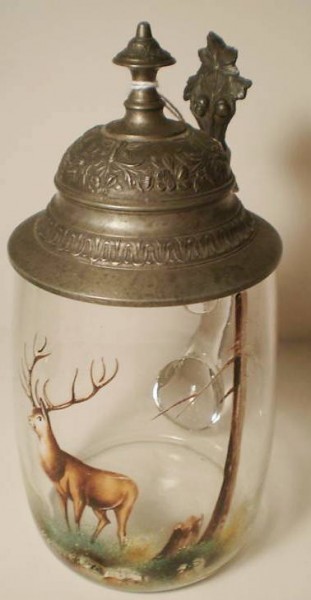
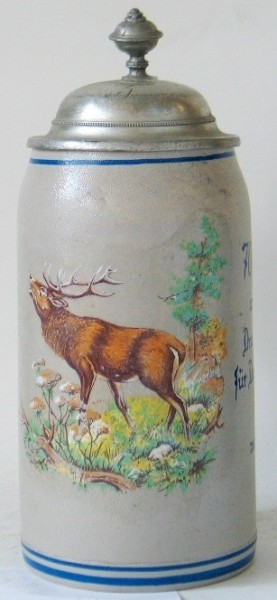
Above and below: A couple of other examples of the solitary deer.
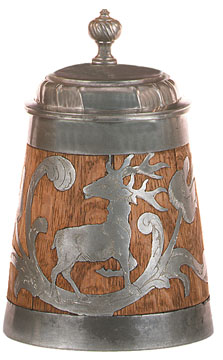
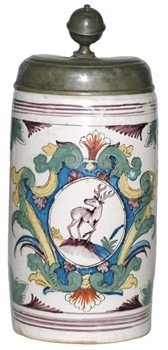
[l] “Newer” version of a Thurigian Daubenkrug, about .75 liters. Made in the mid to late 1800’s.
[R] Half liter fayence, Erfurt, Dtd. 1767 [RFA]
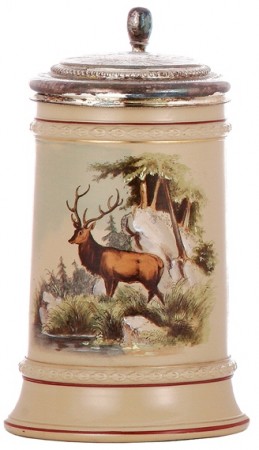
V & B Mettlach stein, .5L, 406, transfer & hand painted, stag, with a silver-plated lid. [tsaco]
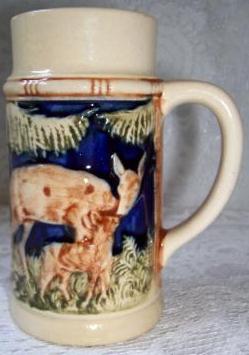
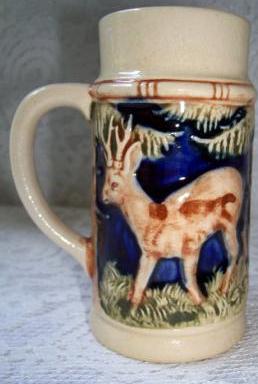
Even the “tots” would get a love present = .25 liter pottery relief “kinder mug.” Circa 1910. [FWTD]
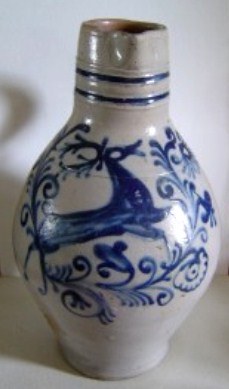
A large Westerwald stoneware jug. Hand painted. Circa 1900 I think.

Another beautiful example. 15 inches (1.5 liter) blown pink stained glass with enameling. Circa 1880-90. Quite possibly Theresienthal’s work. I would be very happy and proud if one of my friends gave this one to me. [tsaco]
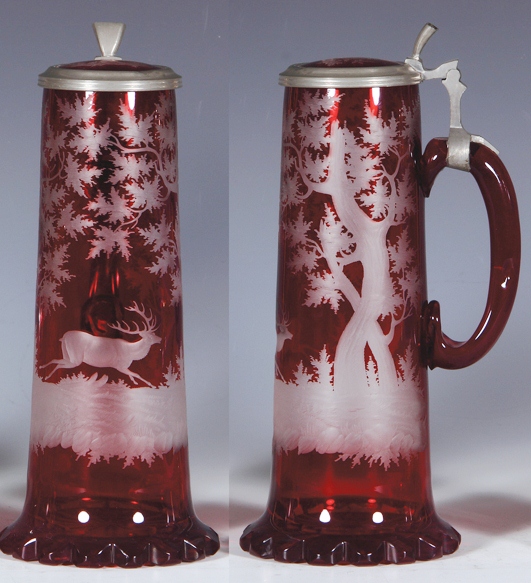
And if you have a really nice friend, you might have bought him this Bohemian ruby stained cut-to-clear stein. Circa 1850. [tsaco]
As can be seen this tradition has been carried on. This is a Art Deco or Jungenstil .5 liter stoneware stein. Ca 1920-30’s,
HUNTER’S STEINS
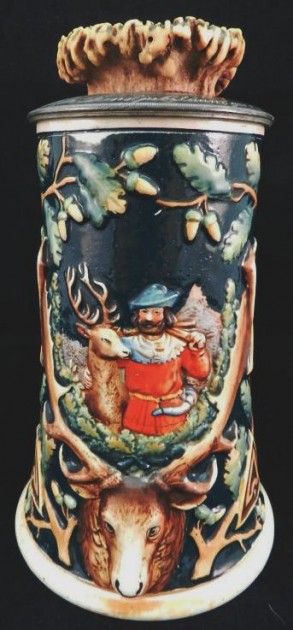
This is very definitely a “hunter’s or hunting” piece and has nothing to do with friendship. (This is not St. Hubertus either.) I think one can readily see the difference in the intent of this stein.
More” Hunter’s ” steins for your perusal ▼:
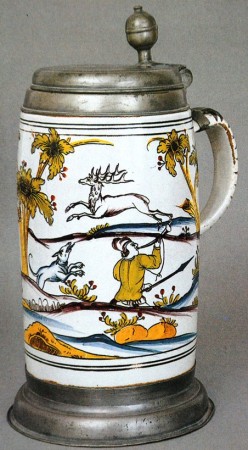
An Erfurt faience stein showing a deer, BUT with hunter and dogs. No love present here only the desire for a “venison burger .”[Comps of William Hamer.]
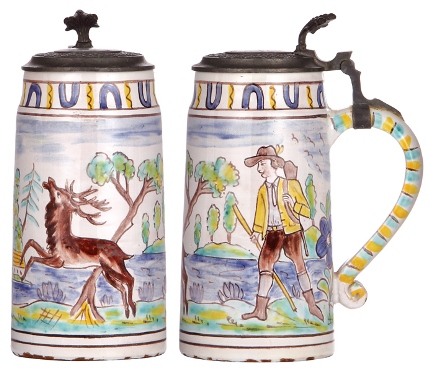
Fayence, 1.0L, 8.6 ht., Austrian, late 1800s,definitely a hunter’s stein. [tsaco]
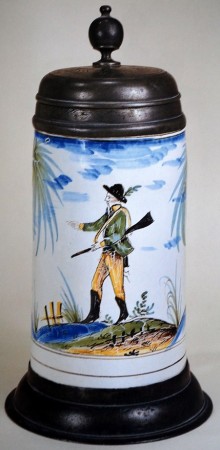
Offenbach faience. [Compliments of William Hamer.]
Here are some examples of other “friendship steins”:
Anytime the “kissing doves” thumblift is shown it should be interpreted as a “Love” token (or very severe friendship.)
Doves, kissing – Shown above ▲: Different varieties of “the kissing doves.” They can signify love / marriage and are usually seen on glass steins from the alpine regions of Bohemia. Circa 1830-60.
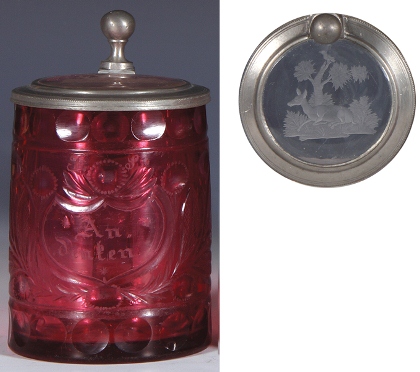
Ruby stained, .5 liter – ‘Andenken’ on front, with engraved deer just on the lid. [tsaco]
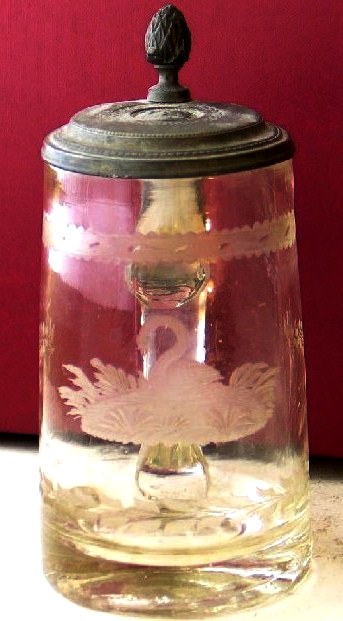
The Swan’s meaning, “Wishing you serenity!” .5 liter, Engraved blown glass, acorn thumblift. German, Ca. 1830 – 1850.[FWTD]
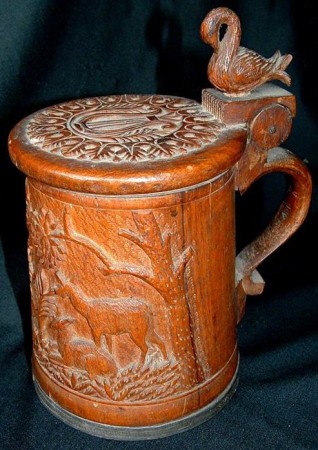
This stein has just about everything one can need to declare friendship and love. Music, deer and a swan for the thumblift! .5 liter carved stein acquired from the auction held at the Schloss (Castle) Marienburgin late in 2005. Obviously custom made for a musician associated with that castle in Hildesheim, a city in lower Saxony. Circa 1860. [FWTD]
[END – SP104 – 22 – R5]
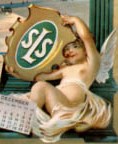 ” It may be that my sole purpose in life is simply to serve as a warning to others!”
” It may be that my sole purpose in life is simply to serve as a warning to others!”

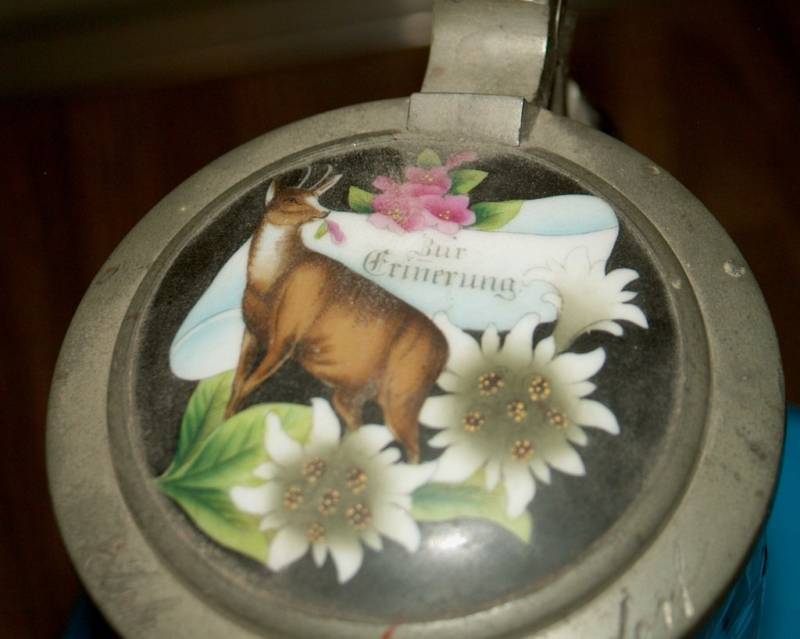
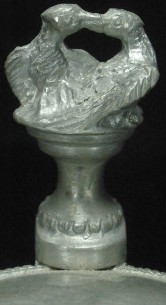
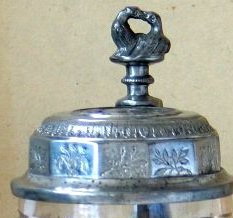
Leave a Reply